London International Disputes Week (LIDW) 2023 main conference addressed various facets of international dispute resolution in a changing world. Looking back to the first edition of LIDW in 2019, when the main concern revolved around Brexit and the consequences of it on London as a leading place of arbitration and international litigation, the following editions of LIDW grappled with COVID-19 and the effects of pandemics, global conflicts etc. A forward-looking approach was taken by the main conference this year, by addressing international dispute resolution in a fractured world, the rapid increase in the use of technology and the resolution of disputes in an efficient and effective manner.
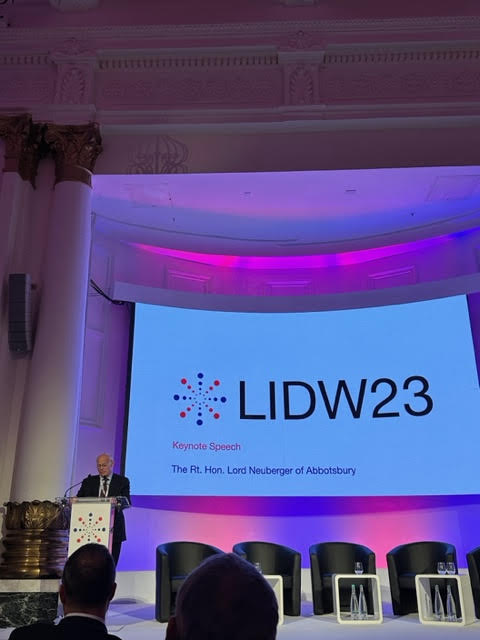
The main conference began with the keynote speech by the Rt. Hon. Lord Neuberger of Abbotsbury, focusing on the technological changes affecting international dispute resolution. Lord Neuberger highlighted that there are two significant technological changes worth considering: quantum computing and artificial intelligence (AI). Lord Neuberger noted that litigation and arbitration have long used AI in its basic forms, primarily in search engines and e-discovery, but the industry is now evolving into using AI in the adjudication of disputes and, probably, in the very near future, in the administrative work for litigation and arbitration. Turning to London as a preferred place for arbitration and international litigation, Lord Neuberger explained that London is keeping up with the changes in international dispute resolution. London also remains at the forefront of international dispute resolution because of the excellent lawyers specialized in dispute resolution practicing here. Highlighting the current amendment process of the English Arbitration Act, Lord Neuberger noted that it is appropriate to pursue this amendment process, and that the Law Commission is suggesting substantive, but not extensive changes. Lord Neuberger concluded with reminding the audience that one of the reasons why London is appealing as a preferred place of arbitration and international litigation, is the rule of law in the United Kingdom, with courts being commercially oriented and arbitration friendly.
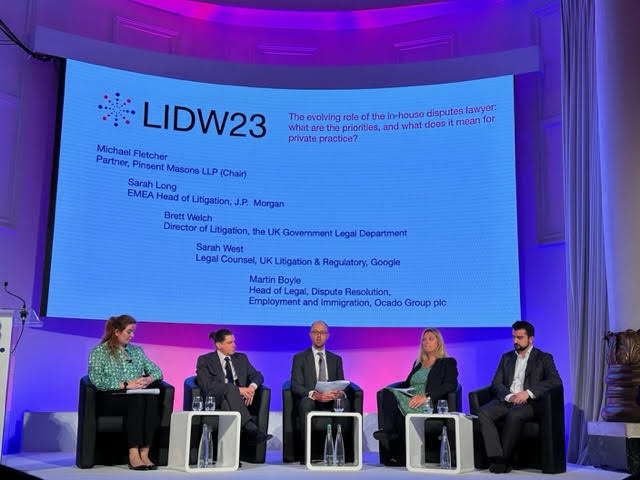
The first panel of the main conference addressed “The evolving role of the in-house disputes lawyer: what are the priorities, and what does it mean for private practice?” and it was chaired by Michael Fletcher, Pinsent Masons. The speakers: Sarah Long, JP Morgan; Brett Welch, UK Government Legal Department; Sarah West, Google; and Martin Boyle, Ocado Group plc discussed the challenges and opportunities revolving around the new types of disputes which their companies and the State are facing. The discussion was conducted under the Chatham House rules. The panel noted that collective redress actions, Environmental, Social and Governance (ESG), Covid-related disputes and those involving sanctioned parties, continue to grow. The panel also highlighted the role of the in-house counsel in building the strategy of a case, while relying on external counsel for their expertise and understanding of foreign law. Furthermore, the panel stressed the importance of in-house counsel in managing risks, as disputes distract the company from the daily business.
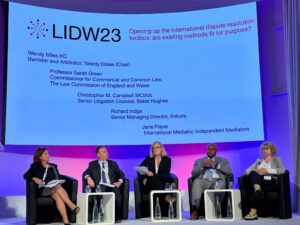 The second panel of the main conference focused on “Opening up the international dispute resolution toolbox: are existing methods fit for purpose?” and was chaired by Wendy Miles KC, Twenty Essex. The panellists: Professor Sarah Green, The Law Commission of England and Wales; Christopher M. Campbell, Baker Hughes; Richard Indge, Ankura; and Jane Player, independent mediator, focused on various aspects of international dispute resolution, including on the suitability of dispute resolution mechanisms for each particular case. The panel stressed the importance of early disposition of issues, including raising these issues early in the arbitration proceedings, which may lead to a settlement of the dispute. Furthermore, engaging a mediator in a timely fashion, particularly in disputes involving complex projects, may be a suitable solution given the advantages of low costs and party autonomy of mediation.
The second panel of the main conference focused on “Opening up the international dispute resolution toolbox: are existing methods fit for purpose?” and was chaired by Wendy Miles KC, Twenty Essex. The panellists: Professor Sarah Green, The Law Commission of England and Wales; Christopher M. Campbell, Baker Hughes; Richard Indge, Ankura; and Jane Player, independent mediator, focused on various aspects of international dispute resolution, including on the suitability of dispute resolution mechanisms for each particular case. The panel stressed the importance of early disposition of issues, including raising these issues early in the arbitration proceedings, which may lead to a settlement of the dispute. Furthermore, engaging a mediator in a timely fashion, particularly in disputes involving complex projects, may be a suitable solution given the advantages of low costs and party autonomy of mediation.
 The third panel of the main conference, addressing “Navigating the maze: cross-border disclosure challenges” was chaired by Charles Hollander KC, Brick Court, and featured Akima Paul Lambert, Hogan Lovells; Joanna Ludlam, Baker and McKenzie; Leon Major, KLDiscovery; and Ra’eesa Mehta, Herbert Smith Freehills. The discussion began with key takeaways to be considered in discovery and document production, including issues as to whether documents are located and which custodian is involved, if there are document preservation measures in place. The discussion also considered discovery broadly by including computer systems and mobile phone applications, getting local advice on various matters concerning document production, as local law may have its peculiarities affecting the process. Further, panellists highlighted the relevance of applicable law in addressing document retention and destruction, for example, in the Netherlands such retention obligation being of seven years, while in Spain, of six years. Other issues regarding document production which were explored by the panel focused on confidentiality and data protection, screening of State documents for State secrets, as well as privilege. Regarding the latter aspect, the panellists highlighted the fact that the meaning of privilege is not the same across jurisdictions, including the categories of beneficiaries of such privilege – an example being the US understanding of privilege, that is broader than the UK one.
The third panel of the main conference, addressing “Navigating the maze: cross-border disclosure challenges” was chaired by Charles Hollander KC, Brick Court, and featured Akima Paul Lambert, Hogan Lovells; Joanna Ludlam, Baker and McKenzie; Leon Major, KLDiscovery; and Ra’eesa Mehta, Herbert Smith Freehills. The discussion began with key takeaways to be considered in discovery and document production, including issues as to whether documents are located and which custodian is involved, if there are document preservation measures in place. The discussion also considered discovery broadly by including computer systems and mobile phone applications, getting local advice on various matters concerning document production, as local law may have its peculiarities affecting the process. Further, panellists highlighted the relevance of applicable law in addressing document retention and destruction, for example, in the Netherlands such retention obligation being of seven years, while in Spain, of six years. Other issues regarding document production which were explored by the panel focused on confidentiality and data protection, screening of State documents for State secrets, as well as privilege. Regarding the latter aspect, the panellists highlighted the fact that the meaning of privilege is not the same across jurisdictions, including the categories of beneficiaries of such privilege – an example being the US understanding of privilege, that is broader than the UK one.
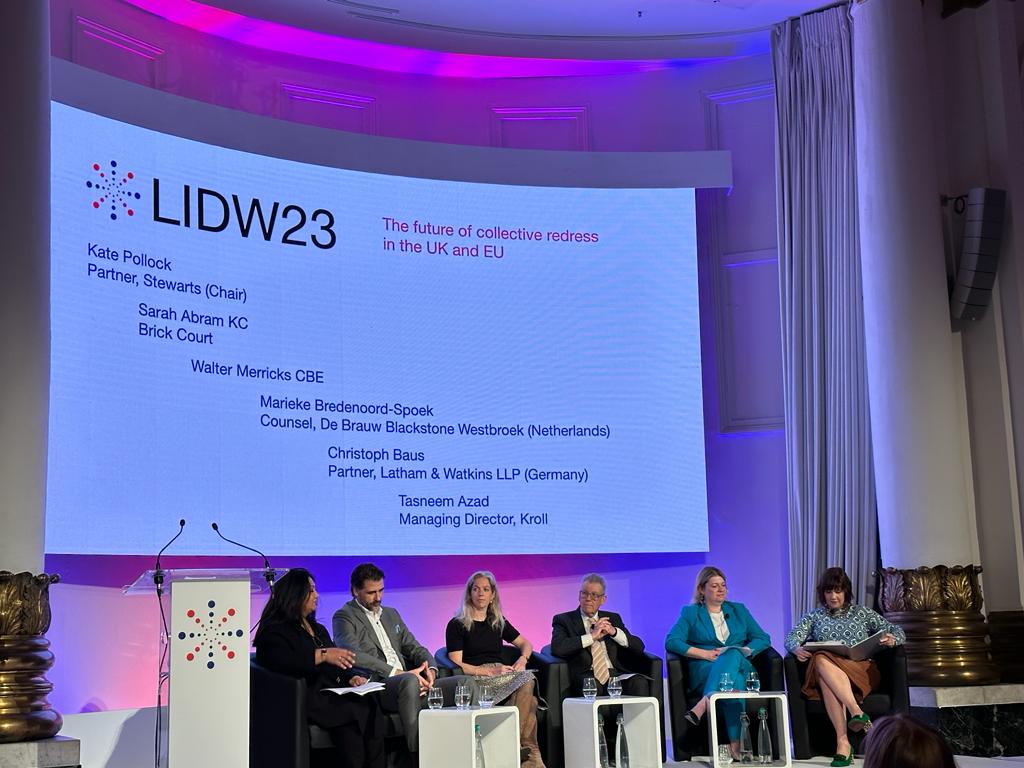
After the lunch, the main conference continued with the panel on “The future of collective redress in the UK and EU”, chaired by Kate Pollock, Stewarts. The panel discussion focused on the UK experience, featuring Sarah Abram KC, Brick Court, and Walter Merricks CBE, on the recently adopted Dutch legislation on collective redress, with Marieke Bredennoord-Spoek, De Brauw Blackstone Westbroek, the German experience, with Christoph Baus, Latham & Watkins, and the quantum expert perspective, with Tasneem Azad, Kroll. The panellists stressed from the outset that the collective redress actions are in place to enable people to club together when individual claims are too small. Readers may recall the relevant multi-claimant investment arbitration cases, in particular the Abaclat v. Argentina, where arbitral tribunals had to take a position on the meaning of class or collective actions. The panellists also highlighted the role of litigation funders in collective actions, as well as the soon-to-be-issued judgment of the UK Supreme Court on litigation funding and these types of actions in R (on the application of PACCAR Inc and others) v. Competition Appeal Tribunal and others.
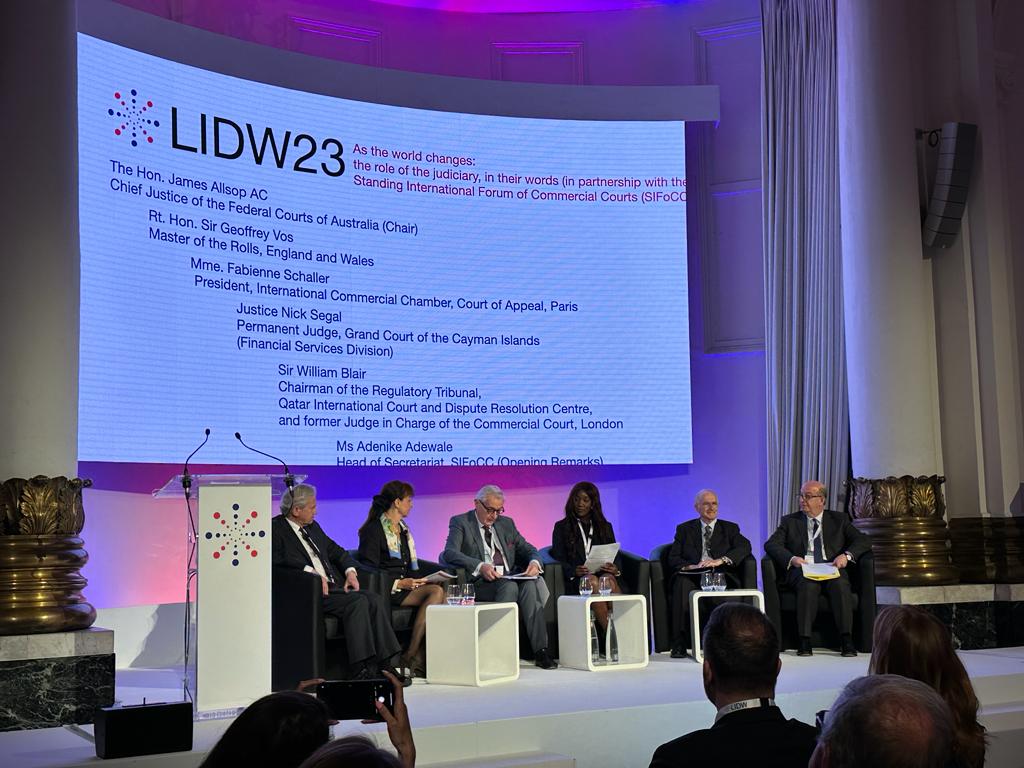 The Hon. James Allsop AC, Chief Justice of the Federal Courts of Australia, chaired the panel dedicated to the judiciary, on “As the world changes: the role of the judiciary, in their words (in partnership with the Standing International Forum of Commercial Courts (SIFoCC))”, and featuring Rt. Hon. Sir Geoffrey Vos, Master of the Rolls, England and Wales; Mme. Fabienne Schaller, president of the International Commercial Chamber of the Paris Court of Appeal; Justice Nick Seagal, Grand Court of the Cayman Islands; Sir William Blair, Chairman of the Regulatory Tribunal of the Qatar International Court and Dispute Resolution Centre, and Adenike Adewale, Head Secretary of SIFoCC. In 2016 Lord Thomas, former Lord Chief Justice of England and Wales, issued an invitation to his counterparts around the world to come together to create a forum for discussion where representatives of commercial courts around the world could share their experience. Formally established in 2017, SIFoCC currently features 45 members – commercial courts around the world, with a view of satisfying three objectives: sharing best practices between courts, with a view of keeping pace with rapid commercial change, together making a stronger contribution to the rule of law and supporting developing jurisdictions in implementing a solid resolution system for commercial disputes. The panel highlighted, among others, the complexity of modern commercial litigation, including the perceived responsibility of courts in addressing ESG claims.
The Hon. James Allsop AC, Chief Justice of the Federal Courts of Australia, chaired the panel dedicated to the judiciary, on “As the world changes: the role of the judiciary, in their words (in partnership with the Standing International Forum of Commercial Courts (SIFoCC))”, and featuring Rt. Hon. Sir Geoffrey Vos, Master of the Rolls, England and Wales; Mme. Fabienne Schaller, president of the International Commercial Chamber of the Paris Court of Appeal; Justice Nick Seagal, Grand Court of the Cayman Islands; Sir William Blair, Chairman of the Regulatory Tribunal of the Qatar International Court and Dispute Resolution Centre, and Adenike Adewale, Head Secretary of SIFoCC. In 2016 Lord Thomas, former Lord Chief Justice of England and Wales, issued an invitation to his counterparts around the world to come together to create a forum for discussion where representatives of commercial courts around the world could share their experience. Formally established in 2017, SIFoCC currently features 45 members – commercial courts around the world, with a view of satisfying three objectives: sharing best practices between courts, with a view of keeping pace with rapid commercial change, together making a stronger contribution to the rule of law and supporting developing jurisdictions in implementing a solid resolution system for commercial disputes. The panel highlighted, among others, the complexity of modern commercial litigation, including the perceived responsibility of courts in addressing ESG claims.
One of the last panels of the LIDW 2023 main conference focused on “Taking a healthier approach to dispute resolution: lessons from the MBC Litigation Guidance” and featured Naomi Pryde, DLA Piper, and Richard Martin, Mindful Business Charter. The panellists focused on the reality that the dispute resolution practice is increasingly facing a mental health crisis which requires serious actions. For this, the Mindful Business Charter Toolkit is a solid start in addressing these concerns in the industry, with the Charter now having more than 130 members, mostly law firms and their clients.
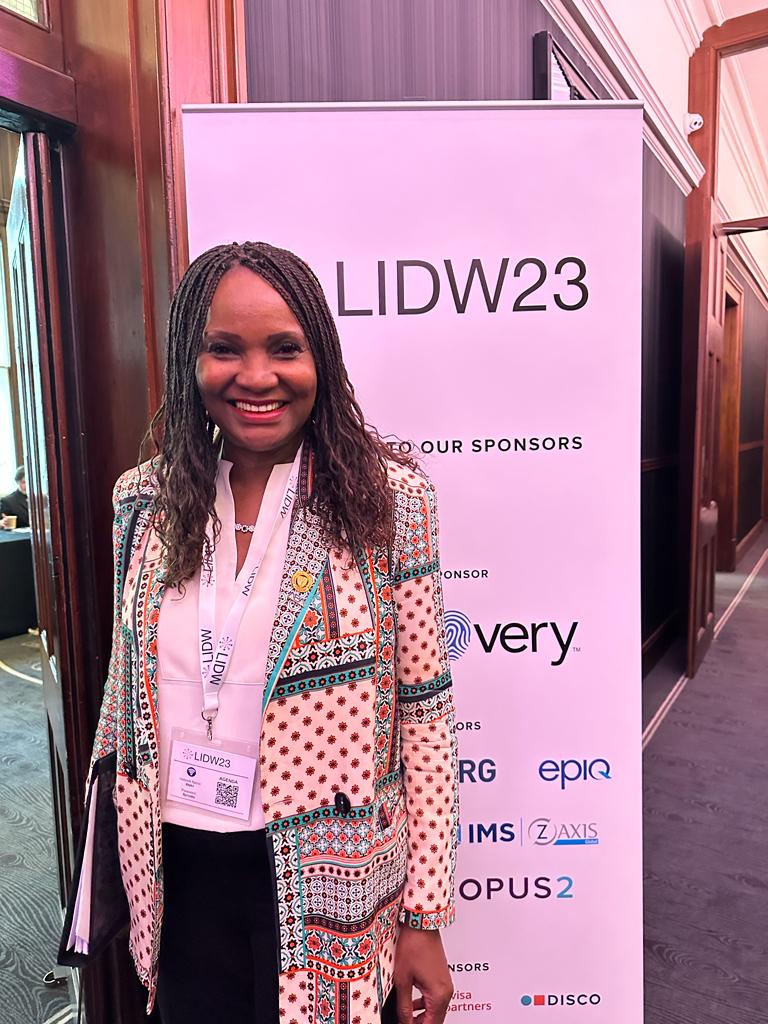
The main conference concluded with a panel dedicated to AI and metaverse, “Looking to the future: how will the metaverse and AI change practice?”, followed by the keynote speech by Deborah Enix-Ross, President of the American Bar Association. Deborah Enix-Ross stressed the importance of the peaceful resolution of disputes. In this context, the role of international dispute resolution practitioners is of utmost importance, as they have the adequate skillset, including experience of working in a cross-cultural environment, to contribute to this peaceful resolution process. Furthermore, one must not forget that international dispute resolution contributes to maintaining and building the rule of law globally.
________________________
To make sure you do not miss out on regular updates from the Kluwer Arbitration Blog, please subscribe here. To submit a proposal for a blog post, please consult our Editorial Guidelines.


